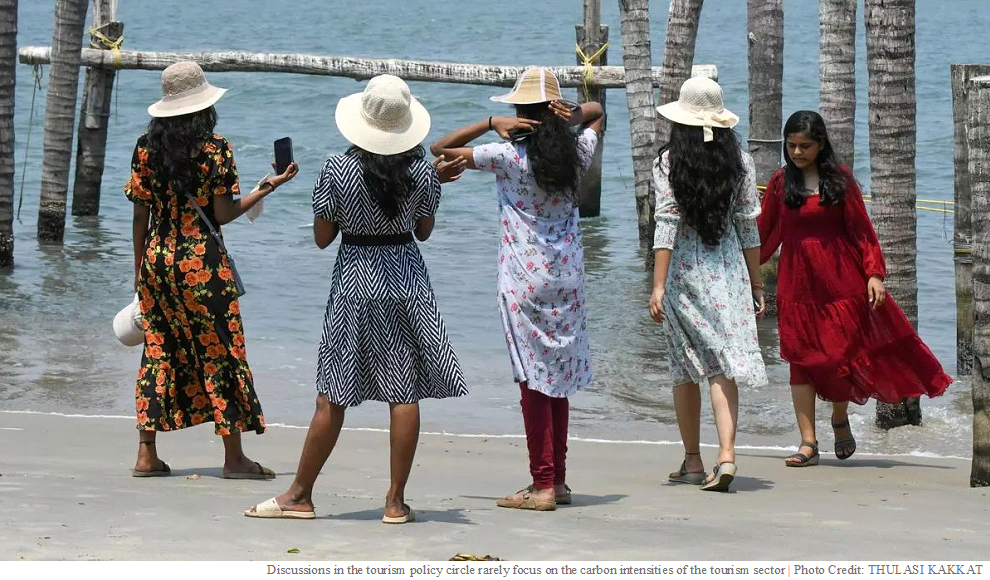Tourism sector will need to go green for growth
19 Mar 2024
Opinion: Sanjib Pohit.
With environmental consciousness gaining ground, reducing carbon footprint in the sector will be vital to attract tourists.
The tourism sector is expected to play an integral role in Viksit Bharat preamble. The projections indicate that this sector is poised to generate employment for 137 million people and contribute an additional $250 billion to GDP by 2030. The sector is predicted to grow at an annual rate of 7.8 per cent by 2031 and its share in GDP is expected to rise to 7.2 per cent. Tourism-to-GDP ratio in India, at 6.8 per cent of GDP, puts it below most of the large emerging/developed economies. As faster growth of employment is must for achieving the goal of inclusive Viksit Bharat, tourism is one sector where India will need to focus in the coming years.
The discussion in the tourism policy circle rarely focuses on the carbon intensities of the tourism sector or ways to reduce it. A primary reason is that the tourism sector is not identified as a separate activity in the standard statistical accounts. As a result, information relating to tourism is buried in some other elements of the core accounts and not readily apparent.
What is available in the Indian context till now is tourism satellite account, which provides information on selected aspects of tourism sector. For instance, in the Indian satellite account, a foreign tourist visiting India on a foreign passport, staying at least 24 hours in the country is classified as one of the following categories: (i) leisure (recreation, holiday, health, study, religion and sport); (ii) business, family, mission, meeting. Whereas, a domestic tourist who travels within the country to a place other than his usual place of residence and stays at hotels or other accommodation establishments for a duration of not less than 24 hours or one night and for not more than 12 months at a time is classified into one of the following types : (i) business and trading; (ii) leisure and holiday; (iii) religious and pilgrimage; (iv) social purposes.
Contribution to GDP
From this tourism satellite account, one can estimate the sector’s contribution in GDP/employment of the various types of tourism activities. It also provides information on the type of commodities/services demanded by foreign/domestic tourists, etc. However, these accounts do not provide us with the carbon footprints of the tourism sector. If the government is keen to increase the share of tourism sector in the economy in the coming years, there is a need to quantify what it means in terms of carbon footprints and what policy interventions are needed to lower its growth.
Do we need to promote specific type of tourism activities to reduce carbon footprints? Does a higher growth of tourism sector impinge on India’s emission target, namely, net-zero by 2070? Of late, eco-tourism that focuses on minimising the negative impact of tourism and promoting environmental conservation, cultural preservation, and social responsibility is the buzz word to enable sustainable growth of the tourism sector. Given the worldwide focus on environmental conscious life style, the Indian tourism sector needs to focus on the same for attracting high valued tourism clientele.
This in turn imply that one needs to measure in detail the carbon footprint of our tourism sector. If any other country can provide credible evidence to show that tourism activities in the same produce lower carbon footprint, it is most likely that a high valued tourist will be more inclined to visit that country compared to India, unless the destination outweighs all other factors. Thus, a measure of carbon footprint is a must for the Indian tourism sector.
Worldwide, there is a trend now to construct an integrated modelling tool for analysing the carbon footprints of various types of tourism activities for inbound foreign or domestics tourism. The tool also provides inputs regarding the role of policy intervention for encouraging the sector to adopt a low carbon pathway. It is time India built such a tool for the tourism sector and moved beyond the static tourism satellite account.
The writer is Professor, NCAER. Views are personal.
Published in: The Hindu Business Line, 19 Mar 2024






